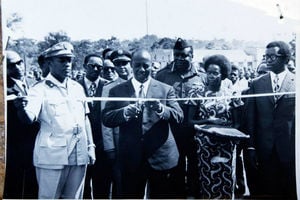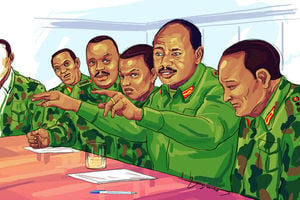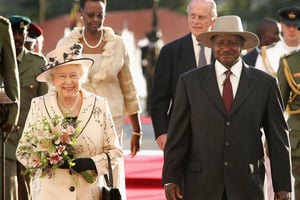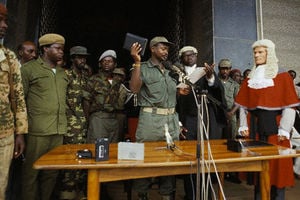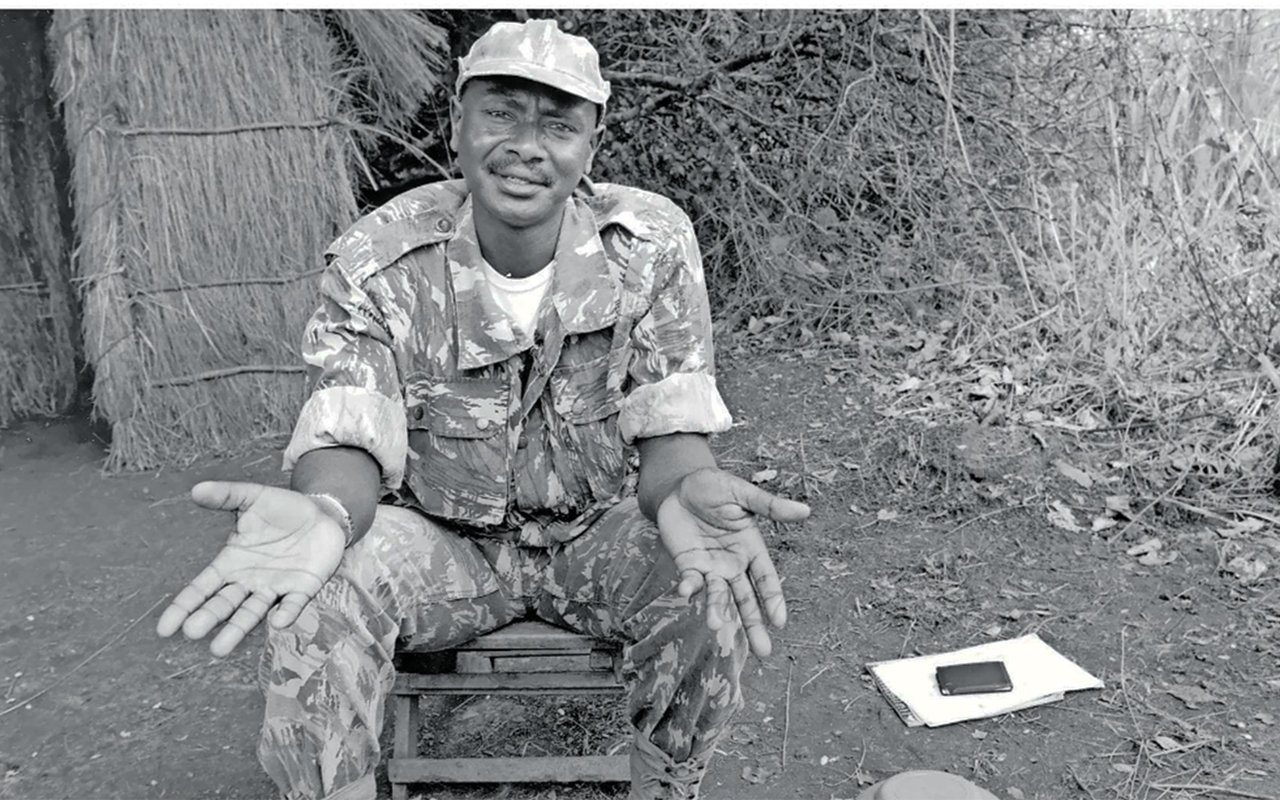
NRA rebel leader Yoweri Museveni in the jungles of Luweero during the 1981-86 Bush War. PHOTO/ FILE
President Museveni said it was necessary for him to explain why he captured power because some people could easily compare him to Idi Amin.
Ten days 29 years ago, President Museveni who had been in power for close to a decade without being subjected to a vote, said he felt embarrassed being referred to as somebody who had “captured power”.
“This business of taking government is not as glorious as you think. I feel a bit embarrassed when you say I captured power,” Mr Museveni said.
Mr Museveni expressed his discomfort while speaking at the Boma Grounds in Fort Portal, during celebrations to mark Uganda’s 33rd Independence anniversary. It was the first time since January 1986 when the National Resistance Movement/Army (NRM/A) took power in Uganda, that Independence Day celebrations were being held outside the capital, Kampala.
According to the Monitor newspaper’s edition of Wednesday, October 11, 1995, Mr Museveni made his feelings about the power grab while reading the citation for the visiting executive prime minister of Ethiopia, Meles Zenawi, who was awarded the order of the Pearl of Africa Class One Award.
The award has since been renamed the Most Excellent Order of the Pearl of African Grand Master under the Ugandan honours system provided for under the National Honours and Awards Act, 2001. It is awarded to heads of state for exemplary service to the nation.
Zenawi, who had the day before been the guest of honour during the promulgation of the new Constitution, was like Museveni, one who had taken power after launching a successful guerrilla struggle.
His Ethiopian People’s Liberation Front captured power in May 1991 after fighting forces loyal to military leader, Col Mengistu Haile Mariam. Mengistu, who headed the junta which in 1974 overthrew the government of Emperor Haile Selassie in a bloody coup, was forced to flee into exile in Zimbabwe as Zenawi’s forces closed in on him.
Zenawi, who passed on August 21, 2012, at the age of 57, later initiated a democratisation process that saw the country get a new constitution, under which he was elected executive prime minister. By the time that year’s independence celebrations were being held in Fort Portal, Uganda had already announced plans to hold its first elections under the 1995 Constitution.
Presidential elections had been slated for April to May 1996 and parliamentary elections for June 1996.
Defence of grab
Mr Museveni, however, said it was necessary for him to explain how and why he captured power because some people could easily compare him to former president Idi Amin Dada.
At the time, Amin who was ousted from power in April 1979 by a combined force of Tanzania People’s Defence Forces (TPDF) and several Ugandan fighting forces such as Museveni’s Front for National Salvation (Fronasa) and Kikoosi Maalum of David Oyite-Ojok, was living in exile in Jeddah, Saudi Arabia.
“Some of the people who captured power should be hanged, but the ones who capture power to liberate it from those who had taken it illegally should be awarded,” he said.
Mr Museveni said Zenawi had done exactly that by returning power to the people before seeking their mandate to lead them, which was justification enough for him to take the Order of the Pearl of Africa Class One Award.
“In fact, he [returned power] much earlier than us,” Museveni said.
Museveni awarded
During the same function, Mr Museveni was also awarded Order of the Pearl of Africa Class One Award by the Deputy Chief Justice, Seth Manyindo, who credited Mr Museveni for defeating “remnants of the fascist forces and bringing peace to Uganda”. Mr Museveni was also cited for having “restored the country’s image abroad”.
Mr Museveni explained away his medal, saying it should not be cause for eyebrows to be raised.
“[For] the one [I have received], since I am here they thought you couldn’t avoid me. It is for heads of state and I have been around for almost 10 years,” Mr Museveni said.
Awards explained
Before reading Zenawi’s citation, Mr Museveni explained that the NRM had come up with the idea of introducing awards as a way of recognising different people’s contributions to the struggle to return Uganda to the rule of the law.
“We thought it was important mainly because of the people who engaged in the fight for freedom of this country,” he said.
He said those who had engaged in the struggle for freedom deserved to be remembered and that the easiest way of remembering their contribution was to give them medals. The reward, he said, would be implemented on the cheap.
“The purpose is to recognise and encourage those who do well and do it cheaply. This is a cheap metal,” Mr Museveni said.
Other medals
Mr Museveni then went on to explain other categories of medals in the honours’ system listing them as the Order of the Pearl of Africa Class II; the Order of the Nile and; the Order of the Crested Crane.
Some of these awards have, however, been tweaked since the National Honours and Awards Act, 2001, came into force.
There is, for example, the Excellent Order of the Pearl of Africa, Grand Commander, which is preserved for spouses of heads of state, vice presidents and crown princes and princesses; the distinguished Order of The Nile, Classes one to five, which is named after the River Nile and; the Distinguished Order of the Crested Crane, classes one to five, which is named after the national bird, the Crested Crane.
Those in the military category were listed as the Order of Katonga; the Kabalega Star; the Rwenzori Star and; the Masaba Start.
The order of Katonga was named after the decisive battle late in October 1985 when NRA rebels engaged forces of the Uganda National Liberation Army (UNLA) at the Katonga River. That decisive battle signified the rebel army’s final victory as it fought to oust Gen Tito Okello and his allies from power in Kampala.
Information on the Ministry of Defence’s website indicates that the Order of Katonga is reserved for “individual extra-ordinary instances of heroism in the army”. It adds that “the instances referred to are those that involve voluntary acceptance of additional danger beyond the call of duty and risk of life”.
The Kabalega Star which has classes 1, 2 and 3 is named after Omukama Kabalega of Bunyoro, who is a symbol of resistance to colonialism.
The Rwenzori Star, which is also in three categories, is named after the Rwenzori Mountains and the Rwenzori region where the NRA retreated to from Luweero, while the Masaba Star is the local name of Mountain Elgon, another region that has links to the very initial days of Mr Museveni’s armed struggles against Idi Amin.
Other military medals include Damu, Swahili for blood, which is for soldiers who were wounded during war; the Luweero Triangle Medal, for all soldiers who took part in the NRA campaign regardless of quality or extent of contribution towards the struggle and; the Nalubale Medal for civilians who took part in the same struggle.
However, on that particular day, in 1995 only three categories of medals were handed out. Those were the Pearl of Africa Class One, the Luweero Tringle and the Nalubale Medal.
Recipients
According to the Monitor newspaper edition of October 10, 1995, recipients of the Luweero Medal on that day were officers and men who had joined the Bush War between 1981 and 1986 “to fight dictatorship and fascist forces which resulted in the capture of state power by the NRA, now UPDF”.
Some of the recipients were vice chairman of the National Resistance Council (NRC), Moses Kigongo; the army commander, Maj Gen Mugisha Muntu; Gen Caleb Akandwanaho, alias Salim Saleh; Brig Chefe Ali; Brig Fred Kamwesiga; Col Kahinda Otafiire; Maj Tom Butime and; Maj Nuwe Amanya Mushega.
Also on the list of awardees was the Third Deputy Prime Minister, Brig Moses Ali, whose Uganda National Rescue Front (UNRF) had a working relationship with the rebel NRA during the five-year struggle to oust Milton Obote.
Some of the recipients of the Luweero Medal were the State minister for Defence, Mr John Patrick Amama Mbabazi; the minister in-charge of Luweero, Ms Janat Balunzi Mukwaya and a number of civilians from Luweero.
About Museveni
RO/0001 Gen (Rtd) Yoweri Museveni. He is President of Uganda and Commander-in Chief, a position he has held since the guerrilla movement he founded, took power on January 26, 1986. Gen Museveni retired from active military service in 2003, famously announcing he was ditching the uniform for the business suit to become a civilian President.

